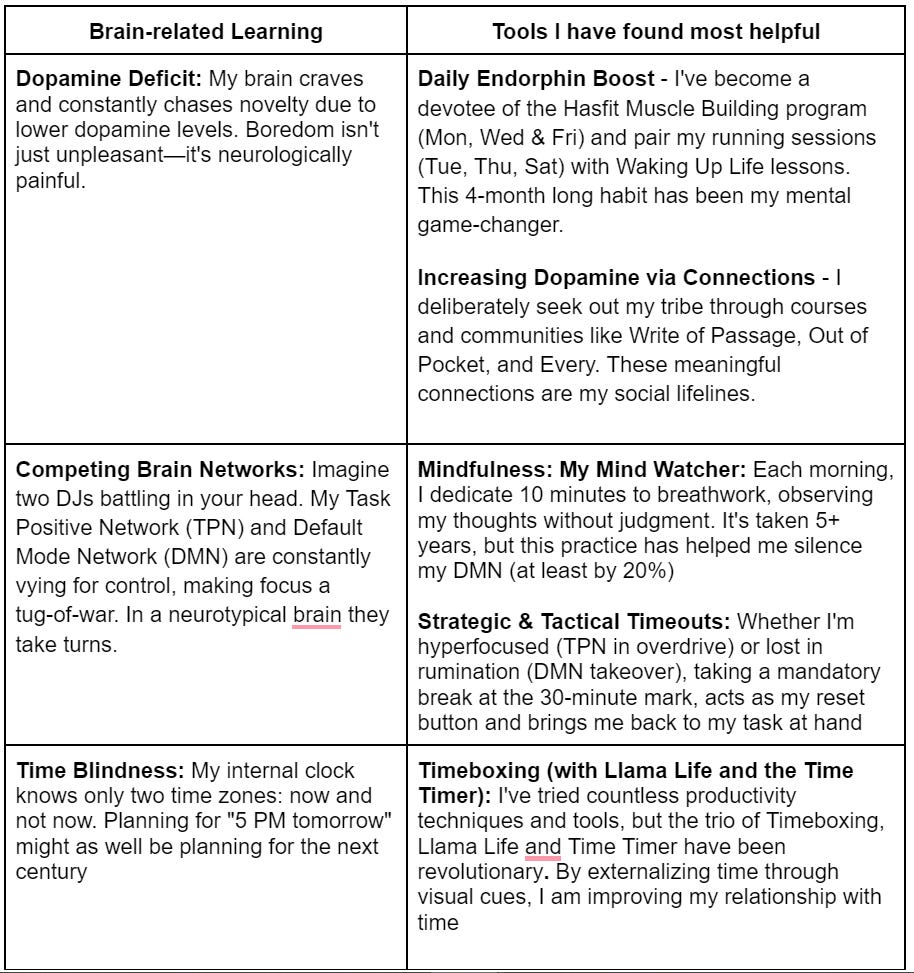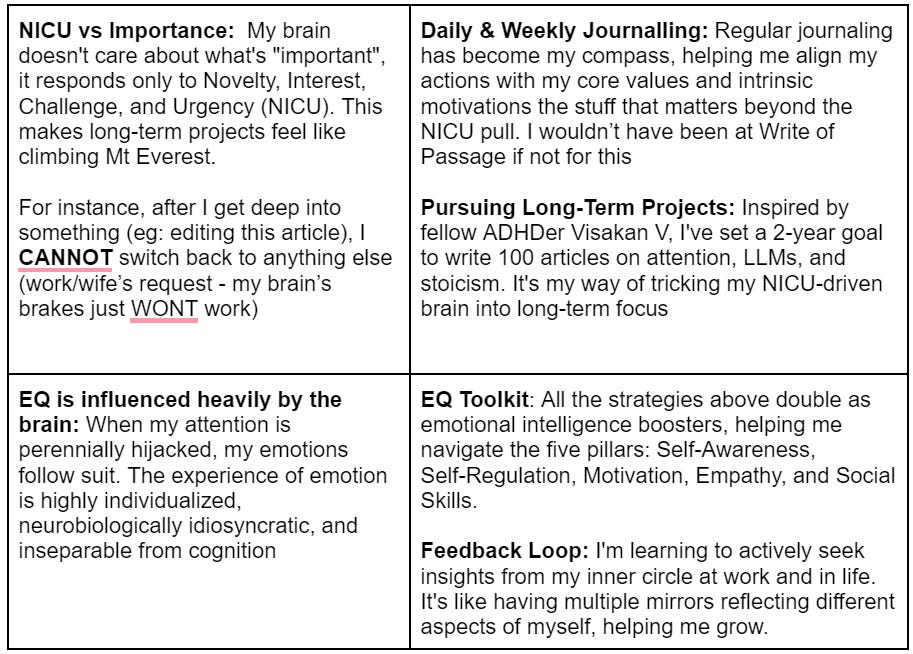My life before and after my ADHD diagnosis
Understanding the unique wiring of my ADHD brain transformed it from my greatest weakness into my most powerful ally
ADHD Explained:
10th Oct 2024
23:00 hrs IST - Online Writing Course - Zoom Session 2 ends
23:01 - 05 hrs - My mind races. Remember seeing a slide that mentioned the "Gardens" essay...Author - Tulika Bahadur... Indian name?... Long article… bored…Who is Tulika?...Upcarta account... Course provider also has an Upcarta? What’s Upcarta? … distracted
23:06 - 30 hrs - Mindfulness kicks in (thanks to 300+ hrs of meditation). Focus on the essay outline. Break it down. Wait—didn't Scott Galloway write something close to the sketch of the 1st essay I’m planning to write?
23:30 - 01:50 hrs - Article isn’t helpful. Research rabbit hole. Three hours done. Five articles deep. No outline. Failure looms. Anxiety spikes.
01:50 - 02:30 hrs - Sleep eludes me. Ideas won't stop. Scribble notes frantically. 3 deep breathing exercises help me sleep at last.
This 3.5 hr episode briefly sums up everything that can go right and wrong w/ADHD.
While I have a strong inclination to try out new stuff, meet new people, and explore the latest self-help fads, I am infinitely more prone to get lost in random rabbit holes, react insensitively to family members, please every non-family member, catastrophize more often and get into a prolonged rumination or depression loops day in day out.
As Dr. Ed Halowell beautifully sums it up: living with ADHD is like driving a Ferrari with bicycle brakes. And this is how Trevor Noah, a fellow ADHDer explains this a bit more in detail:
“A person with ADHD is someone unable to control what he pays attention to. When you have ADHD, you are paying more attention than most people but to the wrong things”.
While unfortunately today it has become a cliche for some people to say we are all a bit ADHD, the sad fact is that ADHD affects only just 3-7% of adults and is largely due to genetic causes. The darkest statistic about people with ADHD is that it reduces their life span by nearly 13 years (compared to 2.4 years for an average smoker and a couple of years for diabetes and obesity). About two–thirds of people with ADHD have their life expectancy reduced by 21 years.
Life Before My Diagnosis:
Emotional breakup of my waking moments before my diagnosis
I still remember that feeling when I was constantly chasing self-improvement, but never quite catching up. I was the poster child for the term "self-help junkie." I mean, I spent more time trying to fix myself than actually living my life.
I had this nagging feeling that I was always underachieving. And somewhere along the line, I got it into my head that the only way to be a better husband, dad, son, brother, employee, or friend was to keep improving myself. It was overwhelming and exhausting.
I was always on the hunt for the next big life hack that would magically solve all my problems. I'd jump from one guru to another, spending ridiculous amounts of time devouring their work. And the kicker? I was doing this instead of caring for my health, focusing on my work, enjoying my hobbies, or nurturing my relationships.
It was like being stuck on a hamster wheel of self-help. Read, forget, search for the next big idea, repeat. An eternal loop of information that never quite stuck. Looking back, I can't help but shake my head at how much time I spent chasing solutions when what I really needed was understanding.
Illustrative list of authors/content I have consumed without contemplation and action in my 20s:
The Accidental Diagnosis:
Have you heard first-hand experiences of people who say a random conversation changed their life? I didn’t believe it until it happened. My brother once mentioned something Gabor Mate said about kids from troubled homes (like ours) being more likely to develop ADHD. I didn't think much of it then, but later, during one of my regular internet deep dives, I ended up downloading Mate's book "Scattered Minds" on my Kindle.
Fast forward to a particularly rough day at work. I was feeling pretty low, so I curled up with my Kindle – because reading has always been my go-to coping mechanism when life gets tough. As I started reading, it was like looking into a mirror. This book was describing my daily life with scary accuracy. It mentioned another book, "Driven to Distraction," calling it the ADHD bible. Of course, I had to get my hands on that one too.
Then came August 5th, 2023. It's funny how some dates stick with you, right? As I started reading about the case examples of Jim, Maria, Penny, and Douglas in "Driven to Distraction, I couldn't hold back my tears. After just three chapters, I was in tears, struggling to catch my breath as I frantically showed my wife passages that described my behavior with eerie accuracy. It was like someone had been following me around, taking notes on every aspect of my life. It was overwhelming, scary, and weirdly comforting all at once.
We had been going through couples counseling since Dec 2022, and so it was a no-brainer for my therapist to prescribe Ritalin, right after our session wherein i had described my experiences of reading that book.
Life After Diagnosis:
Have you experienced a moment when everything suddenly clicked into place? That's what my ADHD diagnosis did for me. It was like someone flipped a switch, and suddenly, all those struggles I'd been beating myself up over, weren't character flaws – they were just part of how my brain is wired. This realization hit me with a tidal wave of self-compassion. For the first time, I could look at myself and think, "Hey, you're not bad, flawed, or selfish. You're just... different." And let me tell you, that changes everything.
I started to forgive myself for past mistakes, for the times I'd fallen short. I began to see my failures and imperfections not as proof of my inadequacy, but as just another part of life – my life, with my uniquely wired brain. This shift in perspective? It's the cause of everything that's changed since my diagnosis. It's like I've been given a new pair of glasses, and suddenly, the world – and my place in it – looks very different. Trevor Noah suggests that understanding ADHD accounts for 80% of its treatment, and I couldn’t agree more.
I’ve witnessed a huge transformation in my life, thanks to behavioral modifications and Ritalin. For instance, I won the Leading by Example award (at work) in Q2 2024, my wife is amazed by the number of trips we have taken this year, and most importantly, I know viscerally that I am not the man I was before my diagnosis. After that self-compassion and acceptance, I had to own my diagnosis and learn to live life with the condition. And that has been possible only because of understanding how my brain and mind work. Charlie Munger famously said: All I Want To Know Is Where I'm Going To Die So I'll Never Go There, and this whole diagnosis has shown me where i’ll get lost, so i constantly try to not go there. Mishaps still happen, but their frequency has reduced by more than 50-60%.
Understanding my ADHD brain has made all the difference since my diagnosis. Here's a glimpse into what I've learned about my unique neurological wiring and the strategies that have been game-changers in managing my ADHD (and stuff that I think can help even those without ADHD given the challenges with attention we all seem to face today):
This journey of self-discovery and adaptation continues to evolve. While ADHD presents unique challenges, it also offers a perspective on life that is vibrant, creative, and full of potential.
Just look at those who also had ADHD and learned to manage it well: Michael Phelps, Simone Biles, Noah Lyles, Justin Timberlake, Adam Levine, Bill Gates, and many more. Dr Ed Halowell even takes it further by saying that the USA was built by people with ADHD (not sure if that could be proven). But isn’t that inspiring?
By understanding and working with my brain's quirks rather than against them, I'm not just managing my ADHD, I'm harnessing its power to live a richer, more fulfilling life.








I don't think I have ADHD, but a lot of what you point out strikes a chord with me.
My version of 'can't switch when deep into something' -> until the essay gets published, it is swimming and dancing in my head
And love Visa's Rule of 100, it's helpful having simple rules to cut through the uncertainty, self-bullshit and general nonsense the mind can come up with to not work
Thank you